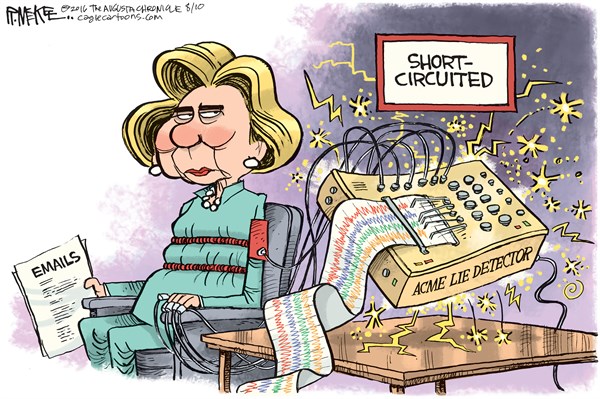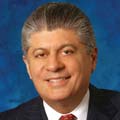
When former Secretary of State Hillary Clinton was asked last week if she has misled the American people on the issue of her failure to safeguard state secrets contained in her emails, she told my Fox News colleague, Chris Wallace, that the FBI had exonerated her. When pressed by Wallace, she argued that FBI Director James Comey said that her answers to the American people were truthful.
After Clinton recognized that even her strongest supporters doubted her statement, she attempted to walk it back. In doing so, she repeatedly lied again, but offered as an excuse a bizarre claim that she had "short-circuited" her answer.
Who knows what that means? She claimed that she and Wallace were talking over each other and her answer had been misunderstood and misconstrued. Yet, Clinton said that Comey exonerated her as being "truthful" to the public when in fact he stated that she had been truthful during her three-hour, closed-door, unrecorded interview with the FBI.
Clinton told a group of largely pro-Clinton journalists that she had short-circuited her remarks. Then, she acknowledged that Comey had only referred to whatever she told the FBI as being truthful. Then, she lied again, by insisting that she told the FBI the same things she has told the press and the public since this scandal erupted in March 2015.
But that cannot be so, because she has issued a litany of lies to the press and to the public, which the FBI would have caught. In her so-called clarifying remarks, she again told journalists her oft-stated lie about returning all work-related emails to the State Department. She could not have told that to the FBI because Director Comey revealed in July that the FBI found "thousands" of unreturned work-related emails on her servers, some of which she attempted to destroy.
On the state secrets issue, she has told the public countless times that she never sent or received anything marked classified. She could not have said that to the FBI, because even a novice FBI agent would have recognized such a statement as a trick answer. Nothing is marked "classified." The markings used by the federal government are "confidential" or "secret" or "top secret." When Director Comey announced last month that the FBI was recommending against indictment, he revealed nevertheless that his agents found 110 emails in 52 email threads containing materials that were confidential, secret or top secret.
The agents also found seven email chains on her servers that were select access privilege, or SAP. SAP emails cannot be received, opened or sent without knowing what they are, as a special alphanumeric code, one that changes continually, must be requested and employed in order to do so. SAP is so secret that the FBI agents investigating Clinton lacked access to the code.
Could Clinton have legally received, opened, stored or sent a secret or top secret email without knowing it, as she has claimed? In a word: NO.
That's because, on her first day in office, Clinton swore under oath that she recognized her legal obligation to recognize state secrets and treat them according to law — that is, to keep them in a secure government venue — whether they are marked as secrets or not.
This past weekend, we learned how deadly the consequences of Clinton's failure to secure secrets can be.
Last Sunday, Iran executed a scientist who sold Iranian nuclear secrets to the U.S. The secrets were eventually passed on to Secretary of State John Kerry for his use during the negotiations that led to the recent U.S.-Iran nuclear accord. But the sale of the secrets and the U.S.'s payments for them (several million dollars) were consummated under then-Secretary Clinton's watch. The scientist was lured back to Iran, fearing harm to his family. Upon his return, he was arrested, tried and convicted of treason.
One email sent to Clinton, from Richard Morningstar, a former State Department special envoy for Eurasian energy, referred to this scientist as "our friend." The fact that Clinton's aides referenced this spying scientist as "our friend" shows a conscious awareness of their duty to hide and secure state secrets — his name and what he had done for the U.S. Yet, at the same time, Clinton put these state secrets at risk by having them sent to her via her nonsecure home servers. This "our friend" email was a top-secret email, which Clinton failed to keep secure. It was either one of the 110 that the FBI found on her servers or one of the work-related emails she did surrender.
Could this email have been used as evidence in the treason trial of the now-executed scientist?
That is not an academic question. Most of the intelligence community seriously mistrusts Clinton, as her recklessness has jeopardized their work. Some feared that many of their undercover colleagues were compromised or even killed due to Clinton's emails.
Hillary Rodham Clinton has established a clear and unambiguous record of deception. Her deceptions are not about the time of day or the day of the week; they are about matters material to her former job as Secretary of State and material to national security.
Do you know any rational person who continues to trust her?
Comment by clicking here.
Andrew P. Napolitano, a former judge of the Superior Court of New Jersey, is the senior judicial analyst at Fox News Channel. Judge Napolitano has written seven books on the U.S. Constitution.



 Contact The Editor
Contact The Editor
 Articles By This Author
Articles By This Author